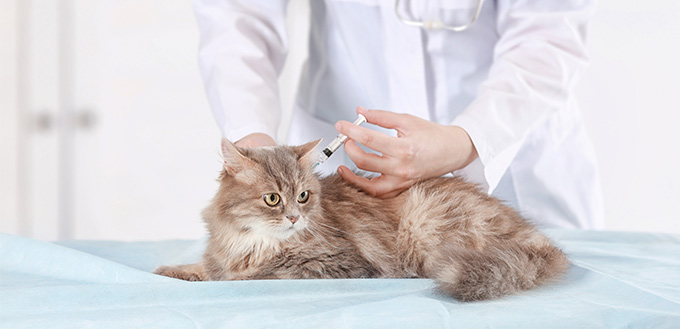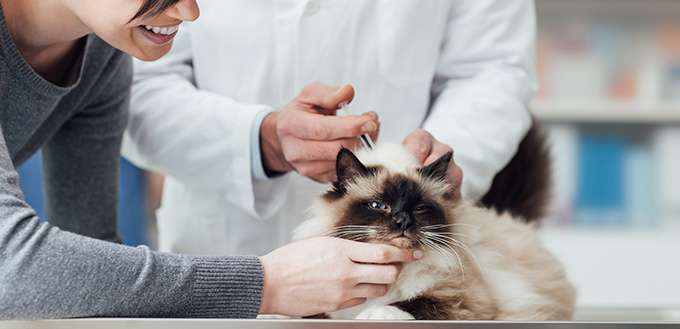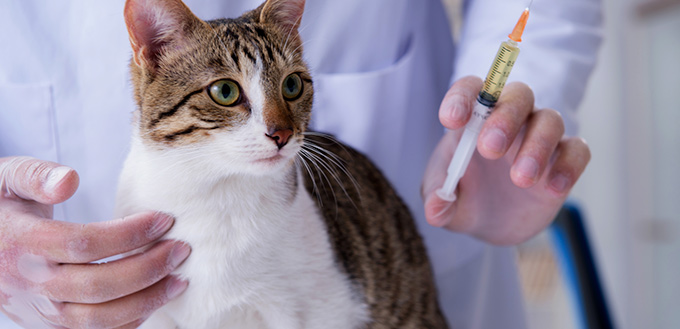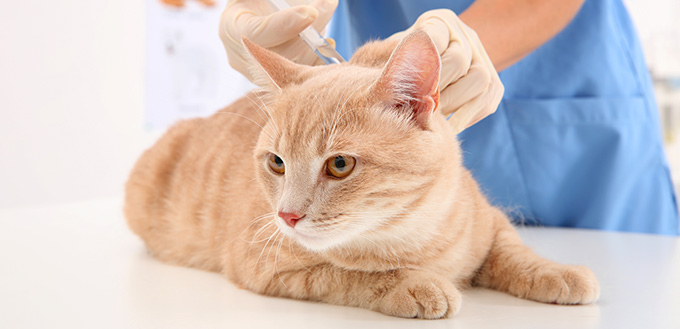As much as we’d like to believe it, the sad truth is, our cat doesn’t actually have nine lives. As responsible cat parents, you need to take proper steps to protect them from all evil. How can you do that? By giving them the right vaccinations at the right time.
Vaccinations are the key to save your cat from harmful bacteria and viruses. In fact, in order to strengthen their immune system, vaccines are a must!
Since we’re no experts, we alone can’t decide which vaccines are best for our cats. It’s the vet who will help you work through your decision with how often your kitty should get the shots. Usually, it depends on their health, age and lifestyle, but if your cat gets in contact with any disease, they are likely to be needing extra vaccinations. Moreover, it’s absolutely necessary to keep yourself updated with the rules and regulations of your local government regarding certain vaccines like rabies.
So without further ado, let’s get into the details of vaccinating your cat.

What Are Some of the Most Important Vaccine in Cats?
Flea Shots
If you think your cat is protected from fleas from being indoors, think again. Even though your cat maybe indoors most of the time, insects can happen in any cat. Fleas are contagious and can transfer from one pet to another. Insects are well-known for their remarkable capacity of spreading and surviving. They roam around freely and make their way to their new house under their own steam.
Related Post: Best Flea Collar for Cats
For all that, a cat does not really need a flea preventive shot. Flea preventive shots are entirely optional, and it depends on whether you want to put your tiny creature through the painful process or not just to stay extra safe.
Fleas are insidious and may infest your cat without your knowledge. There are many other ways you can prevent fleas infesting your cat other than a shot. So, it’s better to adopt preventive measures against fleas instead.
Related Post: Best Flea Treatments For Cats
Heartworm Prevention
Heartworm diseases in cats are very subtle. They spread mainly from mosquitoes and may cause some dramatic symptoms in cats. The American Heartworm Society strongly recommends for heartworm prevention in cats. Most importantly, heartworm preventives are excellent protection against intestinal worms that may spread from the animals to their humans too.
Go for this preventive measure since it’s most applicable for indoor cats who have a higher chance of getting infected by mosquitoes.
Multivalent Cat Vaccines
In the past, kittens were given a 3-way vaccine, which contained the agents against herpesvirus, calicivirus and feline panleukopenia (FRCP). All of those were presented in one shot and was considered the ultimate vaccine for all cats.
However, controversies over multivalent vaccines had become a heated discussion among experts. While some agreed to the great adjuvants of the multivalent vaccines, others would strongly disagree. Either way, vaccinations should be viewed as a medical requirement rather than a routine procedure.
Booster Shots
While other shots may not have a straightforward answer to whether it should be given or not, when it comes to booster shots, there’s no grey area. If you’re wondering whether your cat needs a booster shot annually, the answer to that is just no.
Cat vaccinations are inversely proportional to their age. When they are kittens, shots are essential since unvaccinated kittens succumb from feline panleukopenia at high rates. Therefore, cat owners are highly recommended to have their cats vaccinated at 6 – 8 weeks, 10 – 12 weeks and 14 – 16 weeks of age. Only a booster should be given at the age of 1. Vets do not recommend cat owners to give their cat any boosters more often than every 3 years.
Do take note that FVCRP vaccination is the most crucial part of your cat’s routine. Other than that, there is one more vaccine that is in everyday use. It protects against feline leukemia or FeLV for the cats who remain outdoors mostly.
Rabies Shots
This is perhaps the most common vaccination for cats: the vaccination against rabies. As you already know, rabies is a deadly infectious disease in both cat and humans. In fact, no other condition could be more dreadful than rabies. Rabies spread through direct contact with infected mammals.
Now the big question is should you vaccinate your cat against rabies? Well, this depends on a number of factors which include your local laws, your cat’s likelihood of biting other people and the tolerance for the risk. If you think that there is a definite risk considering all of that, then you should get your cat vaccination against rabies.

How Often Do Cats Need to be Vaccinated?
There’s no right or wrong answer to this question. The truth is, it depends on what you are trying to protect your cat from. Is it fleas? Or are you looking forward to the healthy growth of your kitty for which you think that shots are necessary? If you aren’t sure about the answers to the questions, well then, here are some guidelines of vaccines that will help you to make sense of cat vaccines and other preventive measures.
How to Determine Whether Your Cat Need Vaccination?
We’re sure you take real good care of your cat and that if you notice a slight single change in their behavior or physical attributes, the next thing you’d do is run to the vet. If you have a senior cat, chances are you will take them for frequent checkups.
Since your cat cannot talk, their health examination results are their way of telling you about their health. If there’s something wrong about it, your vet will tell you about it, and that’s when vaccinations come in. Here’s what you should review with your vet about your cat’s health during the annual physical exam:
- Vaccination status and their exposure to potential diseases
- Parasite control in their skin such as fleas, ticks, heartworms and mites
- Dental health: you should really take good care of your cat’s oral hygiene and look for signs of oral disease that they might get caught with
- Nutrition: ask your vet if your cat is in good shape and whether they need any change in their meal plans
- Exercise: discuss with your vet regarding how much exercise your cat should receive
- Ears and eyes: any discharge of an unknown substance from their eyes or redness around their ears
- Breathing: check if your cat faces any breathing difficulty or nasal discharge
- Feet and legs: weakness, limping, problems in jumping and toenail problems
- Coat and skin: excessive hairless, too much grooming or itchy spots may mean skin related issues
- Urogenital: changes in their mammary glands, any unknown discharge, urination difficulties should be discussed with your vet
- Blood tests: this is more applicable for geriatric cats, those who are already receiving medications or suffering from medical problems, blood tests should be cross-checked.
Determining Which Vaccinations Your Cat May Need
If you have read about the controversies regarding vaccination in cats, you must already be alert about it. While some experts say that cats need to be vaccinated annually, others believe that vaccination should only be given to cats for a specific disease that has not been determined yet, but the cat is prone to be diagnosed with.
There’s no clear evidence regarding how long a vaccine may last in a cat. For some cats, it may last 5 years and 3 years for another or even less than 2 years for others. Many researchers have done at least three combinations of vaccines and ended up with the result that only rabies is the most important vaccine in cats.
Although some “core” vaccines are to be given to every cat, it also depends on their lifestyle, health status, breed and age that determines if it’s the right vaccine for them.
The AAFP speaks in favor of panleukopenia, feline viral rhinotracheitis and feline calicivirus vaccines to be given to cats every three years. However, they also recommend that cats who are at a higher risk of getting such diseases will benefit from frequent vaccinations.

Do Vaccines Really Protect Cats?
Vaccines are not miraculous. It works by fooling the body into thinking that it is threatened. Therefore, stimulating your cat’s body’s own immune system into producing potential antibodies that fight the invader. Waxing either kill the viruses or we can get the viruses in your cat’s body.
So, the first visit to the vet with your kitty could include a booster shot that is given to enhance their defense system. In older times, vets would always suggest owners bring their cats for an annual checkup, but as times have changed, vets have changed it into a three-year protocol, other than some exceptions.
Some Vaccines that are Not Normally Recommended
These are some of the vaccines that are only recommended in exceptional cases by the American Academy of Family Physicians (AAFP):
- Chlamydiosis: Adverse reactions to vaccines are very common in cats. As far as Chlamydiosis is concerned, it is only recommended if your house has multiple cats with an environment that is prone to having conjunctivitis infections. Consult your vet and if it is deemed to be as an essential, then go ahead.
- Feline Infectious Peritonitis (FIP): Not all cats are infected to this dreadful disease, but one in a hundred cats are likely to have it. The use of this vaccine is controversial. The AAFP guidelines clearly indicate that this vaccine is not recommended, but if needed, your vet will surely advise you regarding it.
- Bordetella: This is more commonly found in canines, so if you have multiple pets in your house (a cat and a dog), your cat may need this. It’s not recommended as a routine use, but exceptions may occur if your cat is exposed in a multiple-cat environment.
- Giardiasis: Another recently accepted vaccine, Giardiasis. This is also not routinely recommended by the AAFP, except for clinical significance like multiple-cat environments.
Some Other Vaccine Exceptions in Cats
- Cats suffering from asthma, hyperthyroidism, chronic renal failure and weak immune systems are not recommended to be vaccinated.
- Consult your holistic vet regarding your cat receiving cortisone therapy.
- Geriatric cats, cats who are 10 years old or above, normally do not require booster vaccinations. However, they need to be tested for titers during their yearly physical checkups.
- Kittens under six weeks of age do not require any vaccinations, other than some sporadic cases like orphaned kittens or kittens at a risky environmental situation.
- Some vaccines may cause stillbirths in pregnant cats.
Side Effects of Vaccinations
Typically, there are no side effects of cat vaccinations, but all cats are unique, and some of them may have an adverse reaction. If you have recently vaccinated your cat, you should be on the lookout for some symptoms. And if these symptoms go out of hand, you should consult your vet immediately:
- Extreme lethargy
- Fever
- Vomiting
- Diarrhoea
- Loss of appetite
- Hives
- Abnormal behavior
- Swelling or redness around the injected site
If you suspect that there are ill side effects of the vaccine, call your vet and determine if your fluffy friend needs any special care.

Bottom Line
Before you go on making any decision about vaccinating your cat, it is suggested that you do your research and consult your vet regarding this. This article is a beginner’s guide to vaccination. In reality, your cat may have different needs. You have ample of other sources from where you can learn more about these vaccinations.
The bottom line is to discuss the issues with your vet so you can figure out a sure way to protect your cat from any illness. It doesn’t necessarily have to be about vaccines if your cat has got any other health issue. And in any case, if your vet agrees to forgo the vaccination scheme, make sure that you still take your cat for an annual checkup.
So, why are you thinking of vaccinating your cat? Let us know in the comments section how things went. We’d love to know!
Sources:
- Why Routine Preventative Care For Your Pet Is Essential, Animal Humane Society
- Sarah Griffin, General Care For Cats, Veterinary Medicine & Biomedical Sciences
- Feline Vaccines: Benefits and Risks, Cornell University College of Veterinary Medicine
- Should My Pet Be Vaccinated?, American Animal Hospital Association
Note: The advice provided in this post is intended for informational purposes and does not constitute medical advice regarding pets. For an accurate diagnosis of your pet's condition, please make an appointment with your vet.






